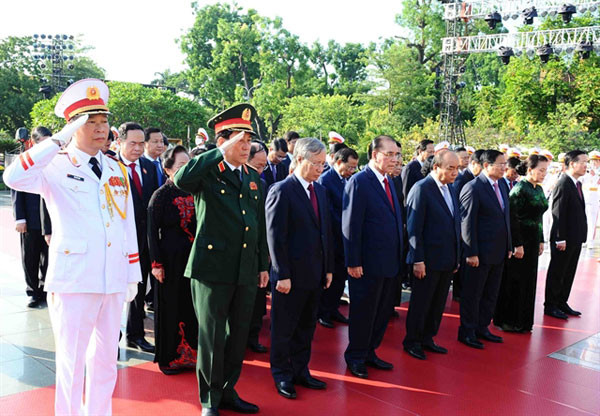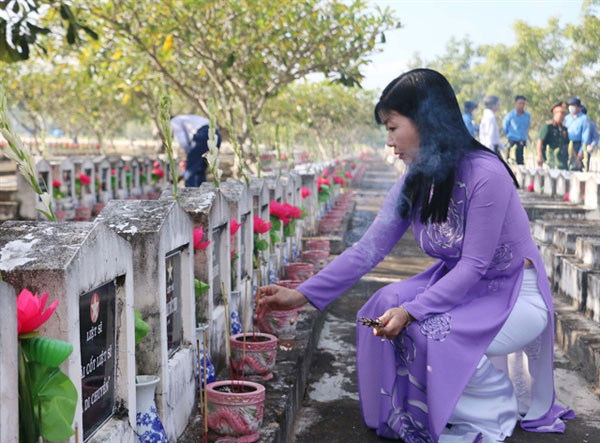in Hanoi for the 75th War Invalids and Martyrs Day (July 27).

A delegation of Party, State, National Assembly, Government and Vietnam Fatherland Front leaders on Tuesday offered incense in tribute to fallen combatants at the Martyrs’ Monument and paid tribute to late President Ho Chi Minh at his mausoleum in Hanoi for the 75th War Invalids and Martyrs Day (July 27).
The delegation included President Nguyen Xuan Phuc, Prime Minister Pham Minh Chinh, former Party General Secretary Nong Duc Manh, former NA Chairwoman Nguyen Thi Kim Ngan, and permanent member of the Party Central Committee’s Secretariat Vo Van Thuong.
They expressed their profound gratitude to the martyrs who sacrificed their lives in the struggle for national liberation, reunification, independence and freedom, for the Fatherland and for the people.
Speed up DNA identification
Prime Minister Pham Minh Chinh visited the Centre for DNA Identification under the Vietnam Academy of Science and Technology in Hanoi on Monday, emphasising the great appreciation people have for martyrs while noting the pain of hundreds of thousands of families still looking for their loved ones’ remains. He called for the relevant authorities to speed up the DNA identification of unknown martyrs.
Recounting his recent visit to the Vietnam-Laos International Martyrs’ Cemetery, where 7,000 out of 12,000 graves hold unknown soldiers, the PM said: “Many families are still waiting in pain for information about their loved one's remains.”
The PM noted the great appreciation and commemoration of the Party, people and the army forces towards people with meritorious service, including martyrs, wounded soldiers and their families, who have made great sacrifices for independence, freedom, reunification and prosperity of the nation.
The PM said on behalf of the Party and the State, he highly appreciated the work of the centre and three other agencies that are tasked with identifying unknown martyrs, namely the Military Institute of Forensic Medicine under the Ministry of Defence, the National Institute of Forensic Medicine under the Ministry of Health, the Institute of Biotechnology under the Việt Nam Academy of Science and Technology.
Over more than 50 years of fighting for national independence and reunification millions of Vietnamese people, with patriotic spirit and unyielding and indomitable will, made huge sacrifices for the noble revolutionary cause.
The war has receded but the pain is still present, especially for the families of the martyrs. Countless mothers, fathers, brothers and sisters are still haunted by the wish to look for their loved ones who died in the war.

More than a million martyrs fell for the nation’s independence. That is millions of unfulfilled dreams and promises to return.
There are countless families who now only wish to find their loved ones’ remains. They never gave up their hope and have been searching for the remains using information given on the death notification letter. Millions of people are still waiting for the results in pain.
He said the support for the people with meritorious services, including the identification of unknown martyrs, was an “important political task” and the responsibility of the entire Party, people and military.
Noting that this was a “very difficult and complex task”, he said it was essential to have close coordination between ministries, branches, agencies and localities, as well as the active support of organisations and individuals, because so many martyrs had died since the war against French and they passed away in many different areas, both at home and abroad.
He noted that from 2011-2021, DNA samples of 41,119 martyrs’ remains were taken, of which 9,403 were analysed and 1,389 martyrs were identified.
The PM said there were many difficulties and challenges in the search, gathering and identification of martyrs’ remains.
The demand was huge while the capacity is still limited and the information, documents and witnesses of martyrs had been decreasing, as had the quality of samples able to be taken from the deceased, the PM said.
He also noted that improper financial mechanisms and limited human resources, as well as lack of application of information technology, were among barriers to identification work.
The PM addressed 10 recommendations to better fulfil this task.
Regarding funding to build a database of families of martyrs whose graves have not been found, he requested the Ministry of Labour, War Invalids and Social Affairs to coordinate with the Ministry of National Defence, the Vietnam Academy of Science and Technology, the Ministry of Information and Communications to soon synchronise data to establish the national database on martyrs, serving the DNA assessment task.
Regarding equipment for DNA identification, he ordered the Academy to identify equipment that needs to be upgraded or bought and send a proposal of funding to relevant ministries or report to the Prime Minister if needed.
The PM also made recommendations on other aspects of DNA identification work including personnel recruitment and training, tax exemption for some services, public-private partnership mechanism, the storage of DNA samples of relatives of unknown martyrs, and international cooperation.
Source: Vietnam News